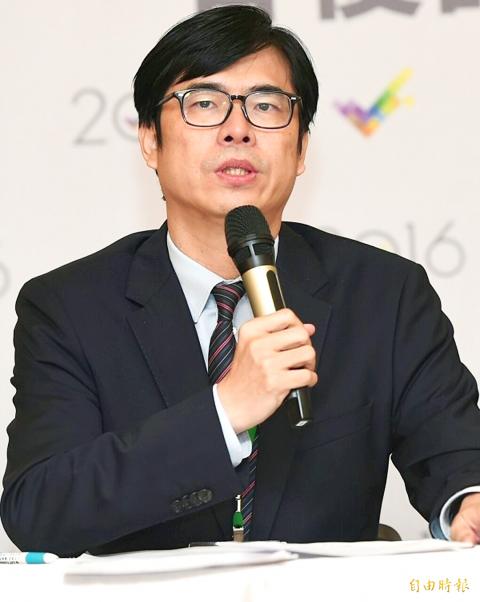Taiwan is to test its cyberdefense capabilities in the first-ever Cyber Offensive and Defensive Exercises to be held with the US in November, Vice Premier Chen Chi-mai (陳其邁) said yesterday.
Chen, who is also head of the Cabinet department for information security, said that in the wake of increasing cyberattacks targeting the government, the department has been holding regular cybersecurity drills to test the readiness and responsive capabilities of related authorities.
As part of ongoing efforts to respond to such threats, Chen said Taiwan and the US are to hold the five-day Cyber Offensive and Defensive Exercises in early November.

Photo: Ko Yu-hao, Taipei Times
The drill was first announced by American Institute in Taiwan (AIT) Director Brent Christensen during a cybersecurity forum in Taipei on Tuesday.
According to Chen, the exercises will be similar to the Cyber Storm exercises, which are the US Department of Homeland Security’s exercises to strengthen cyberpreparedness in the public and private sectors, held every two years.
First launched in 2006, the exercises were last held in the spring of last year.
Chen said the upcoming exercises in Taiwan would be divided into two parts, with the first testing the response of government staff and officials to phishing e-mails or text messages, which are the most common form of cyberattack.
The second part of the drill would examine responses in the public and private sectors to cyberattacks launched from foreign countries or locally, he said.
The Cyber Offensive and Defensive Exercises are scheduled to bring together teams from 15 nations to address simulated cyberthreats from North Korea, targeting social engineering, critical infrastructure and financial institutions, Chen said.
He would not name the 15 countries, saying only that the teams would be Asian, European and American.
The teams are to be designated blue (defense) and red (attack), with Taiwan’s security team as the blue team and the 15 other countries as the red team.
The simulated attacks will attempt to hack official Taiwanese government Web sites to test the capability of local cybersecurity teams to protect them and respond to the potential effects of such attacks, Chen said.
Taiwan is hoping that the debut cybersecurity drill will not only prepare the government for attacks, but also help Taiwan and other nations form a joint cybersecurity network, he added.

The Taiwanese passport ranked 33rd in a global listing of passports by convenience this month, rising three places from last month’s ranking, but matching its position in January last year. The Henley Passport Index, an international ranking of passports by the number of designations its holder can travel to without a visa, showed that the Taiwan passport enables holders to travel to 139 countries and territories without a visa. Singapore’s passport was ranked the most powerful with visa-free access to 192 destinations out of 227, according to the index published on Tuesday by UK-based migration investment consultancy firm Henley and Partners. Japan’s and

NATIONAL SECURITY THREAT: An official said that Guan Guan’s comments had gone beyond the threshold of free speech, as she advocated for the destruction of the ROC China-born media influencer Guan Guan’s (關關) residency permit has been revoked for repeatedly posting pro-China content that threatens national security, the National Immigration Agency said yesterday. Guan Guan has said many controversial things in her videos posted to Douyin (抖音), including “the red flag will soon be painted all over Taiwan” and “Taiwan is an inseparable part of China,” while expressing hope for expedited “reunification.” The agency received multiple reports alleging that Guan Guan had advocated for armed reunification last year. After investigating, the agency last month issued a notice requiring her to appear and account for her actions. Guan Guan appeared as required,

Japan and the Philippines yesterday signed a defense pact that would allow the tax-free provision of ammunition, fuel, food and other necessities when their forces stage joint training to boost deterrence against China’s growing aggression in the region and to bolster their preparation for natural disasters. Japan has faced increasing political, trade and security tensions with China, which was angered by Japanese Prime Minister Sanae Takaichi’s remark that a Chinese attack on Taiwan would be a survival-threatening situation for Japan, triggering a military response. Japan and the Philippines have also had separate territorial conflicts with Beijing in the East and South China

A strong cold air mass is expected to arrive tonight, bringing a change in weather and a drop in temperature, the Central Weather Administration (CWA) said. The coldest time would be early on Thursday morning, with temperatures in some areas dipping as low as 8°C, it said. Daytime highs yesterday were 22°C to 24°C in northern and eastern Taiwan, and about 25°C to 28°C in the central and southern regions, it said. However, nighttime lows would dip to about 15°C to 16°C in central and northern Taiwan as well as the northeast, and 17°C to 19°C elsewhere, it said. Tropical Storm Nokaen, currently